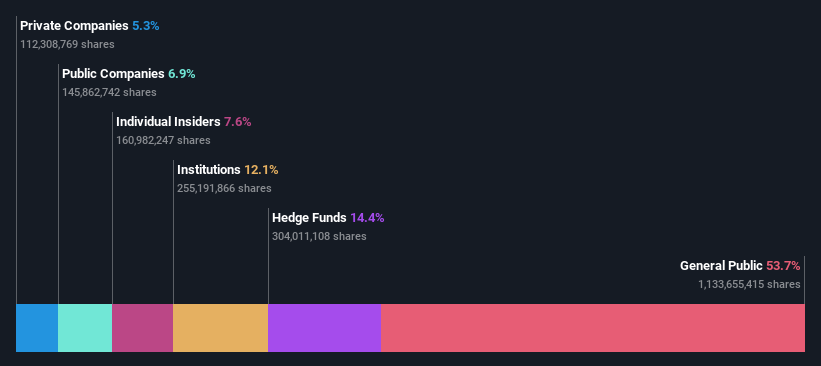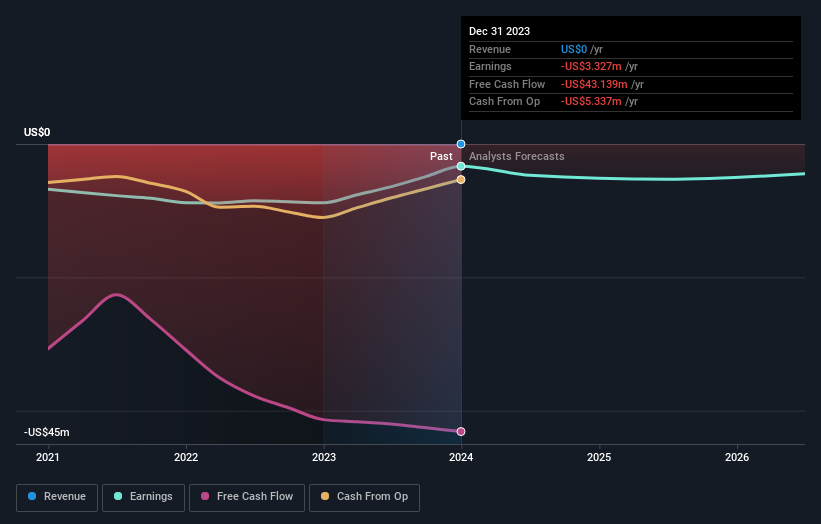Retail investors in ioneer Ltd (ASX:INR) are its biggest bettors, and their bets paid off as stock gained 25% last week
Key Insights
The considerable ownership by retail investors in ioneer indicates that they collectively have a greater say in management and business strategy
A total of 25 investors have a majority stake in the company with 46% ownership
A look at the shareholders of ioneer Ltd (ASX:INR) can tell us which group is most powerful. And the group that holds the biggest piece of the pie are retail investors with 54% ownership. In other words, the group stands to gain the most (or lose the most) from their investment into the company.
Clearly, retail investors benefitted the most after the company's market cap rose by AU$84m last week.
Let's delve deeper into each type of owner of ioneer, beginning with the chart below.
Check out our latest analysis for ioneer
What Does The Institutional Ownership Tell Us About ioneer?
Institutions typically measure themselves against a benchmark when reporting to their own investors, so they often become more enthusiastic about a stock once it's included in a major index. We would expect most companies to have some institutions on the register, especially if they are growing.
As you can see, institutional investors have a fair amount of stake in ioneer. This implies the analysts working for those institutions have looked at the stock and they like it. But just like anyone else, they could be wrong. If multiple institutions change their view on a stock at the same time, you could see the share price drop fast. It's therefore worth looking at ioneer's earnings history below. Of course, the future is what really matters.
Our data indicates that hedge funds own 14% of ioneer. That worth noting, since hedge funds are often quite active investors, who may try to influence management. Many want to see value creation (and a higher share price) in the short term or medium term. Centaurus Capital Limited is currently the company's largest shareholder with 14% of shares outstanding. In comparison, the second and third largest shareholders hold about 6.9% and 3.9% of the stock. Furthermore, CEO Bernard Rowe is the owner of 3.2% of the company's shares.
A deeper look at our ownership data shows that the top 25 shareholders collectively hold less than half of the register, suggesting a large group of small holders where no single shareholder has a majority.
Researching institutional ownership is a good way to gauge and filter a stock's expected performance. The same can be achieved by studying analyst sentiments. While there is some analyst coverage, the company is probably not widely covered. So it could gain more attention, down the track.
Insider Ownership Of ioneer
The definition of company insiders can be subjective and does vary between jurisdictions. Our data reflects individual insiders, capturing board members at the very least. The company management answer to the board and the latter should represent the interests of shareholders. Notably, sometimes top-level managers are on the board themselves.
Most consider insider ownership a positive because it can indicate the board is well aligned with other shareholders. However, on some occasions too much power is concentrated within this group.
Our most recent data indicates that insiders own some shares in ioneer Ltd. In their own names, insiders own AU$32m worth of stock in the AU$422m company. This shows at least some alignment. You can click here to see if those insiders have been buying or selling.
General Public Ownership
The general public -- including retail investors -- own 54% of ioneer. With this amount of ownership, retail investors can collectively play a role in decisions that affect shareholder returns, such as dividend policies and the appointment of directors. They can also exercise the power to vote on acquisitions or mergers that may not improve profitability.
Private Company Ownership
It seems that Private Companies own 5.3%, of the ioneer stock. It's hard to draw any conclusions from this fact alone, so its worth looking into who owns those private companies. Sometimes insiders or other related parties have an interest in shares in a public company through a separate private company.
Public Company Ownership
It appears to us that public companies own 6.9% of ioneer. It's hard to say for sure but this suggests they have entwined business interests. This might be a strategic stake, so it's worth watching this space for changes in ownership.
Next Steps:
I find it very interesting to look at who exactly owns a company. But to truly gain insight, we need to consider other information, too. Take risks for example - ioneer has 4 warning signs (and 3 which are concerning) we think you should know about.
If you are like me, you may want to think about whether this company will grow or shrink. Luckily, you can check this free report showing analyst forecasts for its future.
NB: Figures in this article are calculated using data from the last twelve months, which refer to the 12-month period ending on the last date of the month the financial statement is dated. This may not be consistent with full year annual report figures.
Have feedback on this article? Concerned about the content? Get in touch with us directly. Alternatively, email editorial-team (at) simplywallst.com.
This article by Simply Wall St is general in nature. We provide commentary based on historical data and analyst forecasts only using an unbiased methodology and our articles are not intended to be financial advice. It does not constitute a recommendation to buy or sell any stock, and does not take account of your objectives, or your financial situation. We aim to bring you long-term focused analysis driven by fundamental data. Note that our analysis may not factor in the latest price-sensitive company announcements or qualitative material. Simply Wall St has no position in any stocks mentioned.

 Yahoo Finance
Yahoo Finance 

